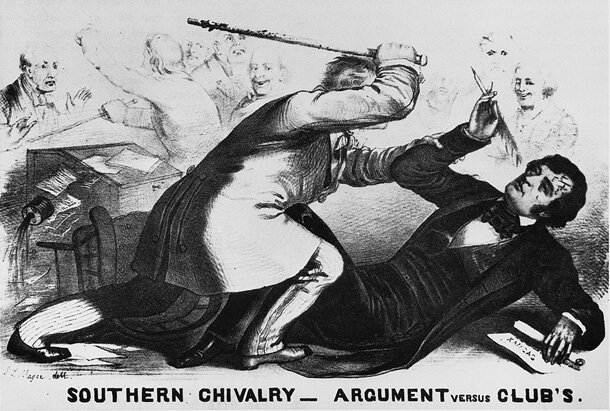1856: The Caning of Charles Sumner
Violence in the Senate
A sympathetic northern cartoonist portrayed Senator Charles Sumner's May 1856 beating by South Carolina Representative Preston Brooks.
Source: New York Public Library
The conflict over slavery reached its zenith during a Senate debate on the floor of the Senate in May 1856. “[A] noise-some, squat, and nameless animal [is]. . . not a proper model for an American senator” pronounced Charles Sumner, senator from Massachusetts and a staunch anti-slavery advocate (Senate.gov). Sumner was responding to the most recent controversy over whether Kansas should be allowed into the Union as a free or slave state. He called out two of his fellow senators – in less than flattering prose – for their unacceptable support for slavery. Three days later, a representative related to one of the senators Sumner had verbally attacked came into the Senate chamber and beat him ruthlessly. What has become known as the “Caning of Charles Sumner” vividly demonstrates the dramatic crises the country faced over slavery’s role in the American system (Senate.gov).
The Dred Scott Case
Dred Scott, 1857.
Source: Wikipedia
As the public debate over free versus slave states continued, an African American slave named Dred Scott pushed the conversation further. He sued for his and his family’s freedom arguing that they had been enslaved in a free state and therefore should be released as free. In 1857, Chief Justice Roger Brooke Taney led the U.S. Supreme Court to reject Scott’s argument. The Court asserted that “negroes, whether slave or free, were not citizens of the United States” (Bogan, 1990, p. 381) and therefore ineligible to make this appeal for freedom in front of the Court. Not surprisingly, Chief Justice Roger Brooke Taney had been born in Smith County, Maryland, to a tobacco farming family who owned slaves (Bogen, 1990, pp. 381-382). This decision, in line with the 1790 Naturalization Act, continued to define Black persons as inferior and not eligible for citizenship in the United States.
